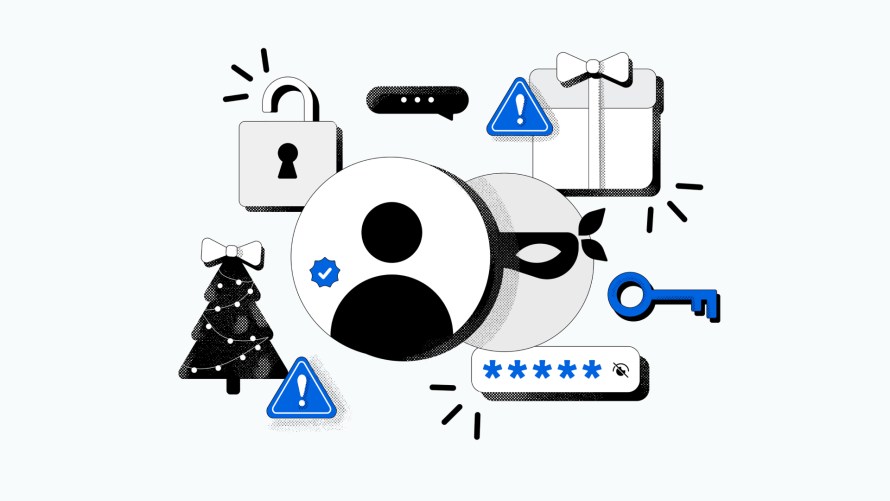
As the holiday shopping season kicks off around the world, we’re launching a global anti-scam awareness campaign to help people stay safe online and on our apps. Scammers are persistent and try to trick people in a variety of ways – malicious texts and emails, websites impersonating known brands, posts on social media, visual discovery platforms and discussion forums, and more.
That’s why, we’re sharing the latest relevant safety tools we’ve launched this year across Facebook Marketplace, WhatsApp and Instagram, new research into holiday scams across the internet we’ve disrupted on our apps, along with updates on enforcements against phishing domains and our work with industry peers to protect people online.
Pre-Holidays Anti-Scam Tips



As you’re looking for gifts and deals online, here are some tips to keep in mind to stay safe:
- Be alert for phishing emails and texts – Scammers may send a text or email from an address mimicking a known brand or even your bank.
- Avoid sharing personal information – Scammers may try to trick you into sharing personal information by asking you to confirm your bank details over text or email or participate in a survey.
- Be vigilant when paying online – Scammers may try to get you to pay upfront or use peer-to-peer payments that cannot be reversed.
Holiday Scams to Watch for
In addition to our ongoing detection and enforcement against scams, we worked with open-source researchers at Graphika to find and disrupt scams that take advantage of the holiday season. Where these scams showed up on our apps, we took action against the scammers behind them, including blocking their websites and taking down their accounts. Here are examples of three common scams to watch out for ahead of the holidays, according to Graphika’s research.
- Holiday coupons. We disrupted scammers offering people in the US, India and the UK fake coupons and gift cards in an attempt to trick them into providing personal information. They posted on several platforms, including Telegram, Facebook and Pinterest and directed people to websites mimicking social media, where they were prompted to fill out a survey with their gender, age, income, employment status and level of interest in cryptocurrencies in order to enter a prize draw. These websites showed fake comments from people claiming they had won in previous draws “despite thinking it was a scam.”
- Promise of Christmas gift boxes. We disrupted scammers targeting French-, Spanish- and English-speaking users with false promises of gifts and prizes. They posted photos of fake prizes on multiple apps, including Threads, X, Facebook and online discussion forums like Quora. If someone commented on the posts, the scammers would direct them to messaging apps or to Google Sites websites and ask for details like their email, phone number, address, income level and outstanding debts in order to win the prize.
- Discount holiday decorations. We disrupted scammers targeting English-, French-, Italian- and German-speaking users with offers of artificial Christmas trees and decorations at extremely low prices. Scammers copied videos of holiday decorations from real people across the internet, and, after adding AI-generated voiceovers describing the goods and warning of limited stock, they posted these videos on multiple platforms like Facebook, Pinterest and others. If someone responded, the scammers would direct them to websites, including some created using Shopify services, to make a purchase that would never arrive.
Our Latest Anti-Scam Tools
Here are the latest anti-scam tools we rolled out this year to help users stay safe.
- On WhatsApp, if someone you don’t know messages you or adds you to a group, you’ll now see a context card giving you more information about the user or the group.

- On Instagram, if an account we suspect to be engaging in potentially scammy activities requests to follow you, we will remind you to be aware of potentially suspicious interactions.


- On Marketplace, we rolled out warnings to alert you if we detect messages that follow the patterns of known scam scenarios.


Taking Action Against Scammers
We constantly work to find and disrupt phishing domains impersonating our brands across the internet by working with others, including registrars and hosting providers globally.
We’ve also taken down over two million accounts on our apps associated with scam centers in Cambodia, Myanmar, Laos, the United Arab Emirates and the Philippines this year alone.
In India, Meta and WhatsApp release monthly transparency reports detailing user complaints received and the corresponding action taken by Meta, as well as our own preventive actions to combat abuse and remove violating content from our platforms.
Raising Awareness on Online Safety
We’re running timely safety education efforts around the globe in partnership with public figures, NGOs, creators, consumer groups and others on an ongoing basis. Here are a few recent examples.
We launched our safety campaign ‘Scams se Bacho’ featuring Bollywood star Ayushmann Khurrana in an effort to educate people on how to stay safe from online scams and promote safer digital practices and also released a musical remake of the iconic track “Oye Lucky Lucky Oye” with Abhay Deol to raise scam awareness.
We’ve also partnered with popular content creators, including Akshath Acharya, thejhumroo, callmeshazzam, among many others to raise scam awareness and literacy in nine different regional languages, empowering users to take control of their online safety and secure themselves from online scams and frauds.
Meta’s national awareness campaign was a joint initiative with three Government entities – the Ministry of Electronics and Information Technology (MeitY), Indian Cybercrime Coordination Centre (I4C) and Ministry of Information and Broadcasting (MIB), reinforcing our commitment to support the Government’s goal of combatting the rising cases of scams and cyber frauds in the country.
As part of our continuous efforts to protect people from scammers, we’ll keep sharing regular updates about our work to counter scams more broadly, including safety tips and product updates rolled out across our apps. Stay safe!
The post Meta Launches Global Anti-Scam Awareness Campaign Ahead Of The Holiday Season appeared first on Meta.















 English (US) ·
English (US) ·